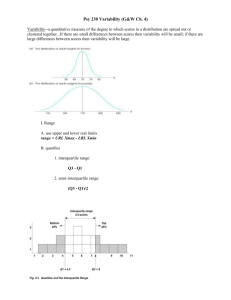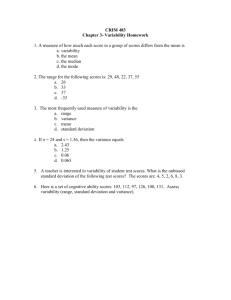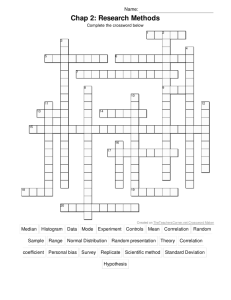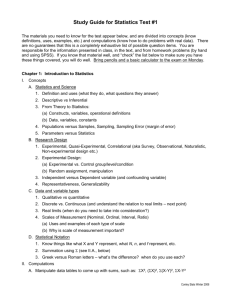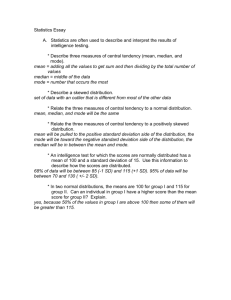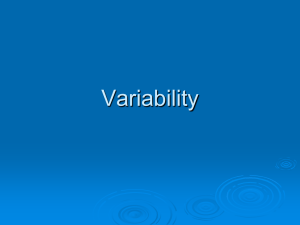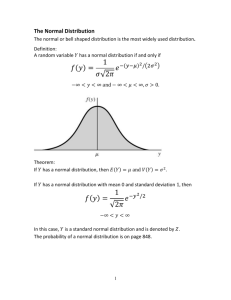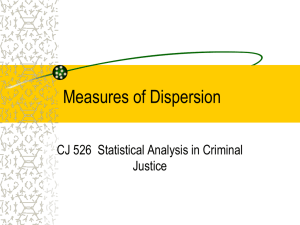Quiz Chapter One
advertisement
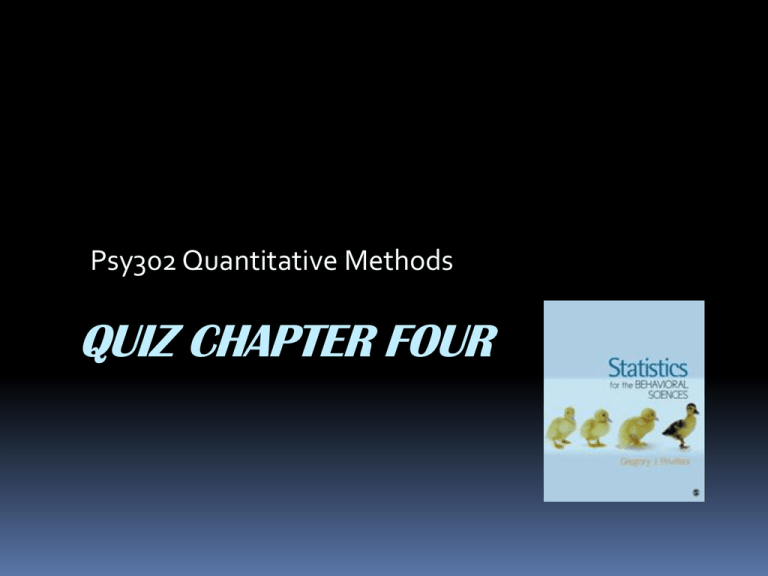
Psy302 Quantitative Methods QUIZ CHAPTER FOUR 1. Variability is a measure of: A. spread B. central tendency C. popularity D. the middle E. all of the above 1. Variability is a measure of: A. spread B. central tendency C. popularity D. the middle E. all of the above 2. The ____ is the simplest way to describe how dispersed or spread out scores are. It involves the difference between the largest value and the smallest value. A. mean B. range C. mode D. standard deviation E. sum of squares 2. The ____ is the simplest way to describe how dispersed or spread out scores are. It involves the difference between the largest value and the smallest value. A. mean B. range C. mode D. standard deviation E. sum of squares 3. The range is seldom used as a primary measure of variability in research because: A. it is difficult to B. C. D. E. compute it is highly skewed it measures central tendency it is based on two values all of the above 3. The range is seldom used as a primary measure of variability in research because: A. it is difficult to B. C. D. E. compute it is highly skewed it measures central tendency it is based on two values all of the above 4. The mean is not used as a primary measure of variability in research because: A. it is difficult to B. C. D. E. compute it is highly skewed it measures central tendency it is based on two values all of the above 4. The mean is not used as a primary measure of variability in research because: A. it is difficult to B. C. D. E. compute it is highly skewed it measures central tendency it is based on two values all of the above 5. Which of the following is an example of a distribution with NO variability? A. scores: 3, 5, 4, 4, 5, and 3 B. scores: 3, 3, 3, 3, 33, and 3 C. scores: 1, 2, 3, 4, 5, and 6 D. scores: 5, 5, 5, 5, 5, and 5 5. Which of the following is an example of a distribution with NO variability? A. scores: 3, 5, 4, 4, 5, and 3 B. scores: 3, 3, 3, 3, 33, and 3 C. scores: 1, 2, 3, 4, 5, and 6 D. scores: 5, 5, 5, 5, 5, and 5 6. The degrees of freedom for the sample variance: A. are equal to the sample size B. are equal to the sample size minus one C. can vary between – and + D. both B and C 6. The degrees of freedom for the sample variance: A. are equal to the sample size B. are equal to the sample size minus one C. can vary between – and + D. both B and C 7. Which of the following is true? A. the standard deviation measures central B. C. D. E. tendency the mean measures variability the standard deviation is always positive the standard deviation is used to describe qualitative data all of the above 7. Which of the following is true? A. the standard deviation measures central B. C. D. E. tendency the mean measures variability the standard deviation is always positive the standard deviation is used to describe qualitative data all of the above 8. Which of the following is a measure of spread or variability? A. mean B. ogive C. variance D. square root E. skewness 8. Which of the following is a measure of spread or variability? A. mean B. ogive C. variance D. square root E. skewness 9. Which shows more size variablity, the 6 boats or the 15 ducklings? A. the boats B. the ducks C. they are the same D. all of the above 9. Which shows more size variablity, the 6 boats or the 15 ducklings? A. the boats B. the ducks C. they are the same D. all of the above 10. The empirical rule states that for any normally distributed set of data, 99.7% of values lie within ____ of the mean. A. 3 standard deviations B. 6 raw score units C. range D. sight E. all of the above 10. The empirical rule states that for any normally distributed set of data, 99.7% of values lie within ____ of the mean. A. 3 standard deviations B. 6 raw score units C. range D. sight E. all of the above The End
